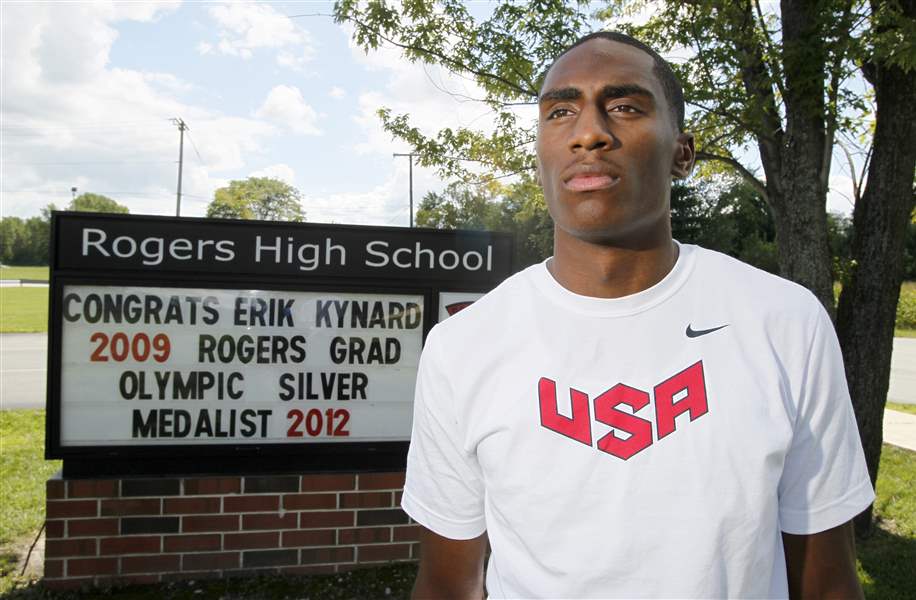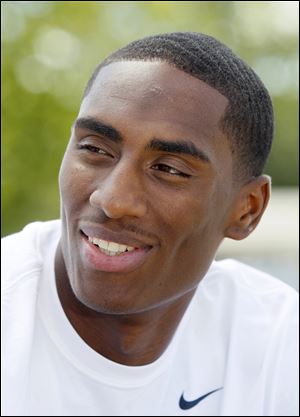
Whirlwind journey: Kynard relishes medal, foray into limelight
8/18/2012
Erik Kynard, Jr. poses in front of a congratulatory sign on Friday at Rogers High School. Kynard -- a Rogers graduate -- won the silver medal in the high jump this month at the London Olympics. Kynard became the first Toledoan to win an individual Olympic medal since Edmund Coffin won gold in equestrian in 1976. Coffin moved away when he was 2.
The Blade/Dave Zapotosky
Buy This Image

Erik Kynard, Jr. poses in front of a congratulatory sign on Friday at Rogers High School. Kynard -- a Rogers graduate -- won the silver medal in the high jump this month at the London Olympics. Kynard became the first Toledoan to win an individual Olympic medal since Edmund Coffin won gold in equestrian in 1976. Coffin moved away when he was 2.
Erik Kynard, Jr., returned to the United States earlier this week from London with a precious medal and a lifetime of memories for capturing an Olympic silver after finishing second in the men's high jump at the 2012 London Olympics.
The 21-year-old Toledo native competed before a worldwide audience that tuned in via live streaming on computers and on tape-delayed television. Kynard is scheduled to be honored today at Rogers High School at 11 a.m. The Kansas State University rising senior recently sat down with Blade sports writer Donald Emmons at Rogers High to share some thoughts about his Olympic journey.
Q: What did it mean for you to participate in the Olympics?
A: It's a great honor. You're definitely representing more than yourself. You're representing your country and your community. Words can't express how honorable of an act it is to be an Olympian.
Q: What does it mean for you to be an Olympic medalist?
A: I can be a little tough on myself, but it's a great accomplishment. The reality of the situation of how I finished is not how I would have wanted to finish or how I would have perceived my Olympic experience. It was great, but like I've said before, it's the greatest loss I've ever had on the biggest stage. It's all good.
Q: What were you feeling while competing in that kind of environment with the world watching?
A: That was all business, stone-cold killer business. I was just taking care of business. I was competing. I'd jump, sit down, and be in my zone. I was having fun. It was obviously one of the biggest stages I've ever competed on, but I make my environment fit me. I'm not one for conformity on any level. I have some big shoes myself, so I make my presence known on the stage and not let the stage's presence dominate me.
Q: With two NCAA high jump championships already won and an Olympic silver medal won, what's left for you to do at the collegiate level?
A: I want to win two more NCAA titles, break some records, hopefully break the NCAA record, and win a World championship.

Erik Kynard, Jr., a Rogers High School graduate who attends Kansas State University, finished second in the high jump to Russia's Ivan Ukhov, who won the gold medal when he cleared 2.38 meters (7.81 feet). Kynard cleared 2.33 meters (7.64 feet).
Q: Do you consider yourself a role model?
A: I can't say I don't consider myself one because that's what I'm considered as. I just try to demonstrate and explain at times, and lead by example. If I'm exemplified to everyone else in the community as a role model then so be it. I appreciate it, and I'm trying to do my best to lead as a good example for my community for kids and adults. Through hard work and dedication anything is possible.
Q: What were your career aspirations while growing up?
A: Growing up, that changed all the time. One week I wanted to be President, the next week I would want to be a lawyer. When I got to school and realized how long you had to go to school to be a lawyer I realized I didn't want to be a lawyer. It changed all the time, but whatever I wanted to do, I said I wanted to be good at it.
Q: What was it like to appear as a guest on the Today Show and Late Show with Dave Letterman?
A: The Today Show was great. To see people that you grew up watching before going to school, like Al Roker, who says, "Here's what's happening in your neck of the woods," and he wanted to take a picture with me. It was like, seriously, you want to take a picture with me? It was a great experience.
The David Letterman show was great. It was fun. It was one of the most enjoyable interviews I've ever partaken in. It was fun.
Q: What was it like staying in the Olympic Village in London for more than two weeks?
A: "It was all right. I was definitely ready to come back to the states. I missed my bed a lot. [But] you definitely feel the companionship between your [U.S.] teammates. It's something that you usually don't get on an NCAA level, especially because you have different levels of athletes, but here everyone is good and everyone is on the same team. Here, it was all about the red, white, and blue. It was great.
Q: What is it about social media that you like, particularly Twitter, where you frequently offer a tweet or two?
A: I leaned away from Facebook. Honestly, I was on Facebook quite a bit before. I leaned away from Facebook just because of the other things that go on Facebook like the negativity. It seemed like every time I got on Facebook it was some bad stuff on there. On Twitter, you have the luxury of following who you want to follow, so I don't follow many people and I unfollow people a lot. So now I don't get any bad news half the time.
If you ever notice, I don't tweet when I'm about to compete. I don't tweet when a competition is coming up. Twitter is definitely an outlet of Erik's random thoughts. It seems to be humorous to a lot of people. I'm pretty sharp, but I don't want everybody stealing my stuff. I may have to copyright my Twitter stuff. I've already said something that's already ended up on a T-shirt [at college].
Q: What was the most interesting moment you experienced during the Olympics that didn't involve you competing?
A: [Being in attendance] watching the [women's] gymnastics. It was something that I've never watched before. Talk about being an Olympian and winning gold, that was a great accomplishment for them and our country. I thought it was amazing. It was like a track meet with so much going on at the same time. It was fun.
Q: What is it about the high jump event that drew you to it back when you were in junior high?
A: It's a battle. It's a very tough event. Nothing is by chance. I feel like it was something I was meant to do, and I'm doing it. I feel like it's something I'm cut out for and I'm built for.